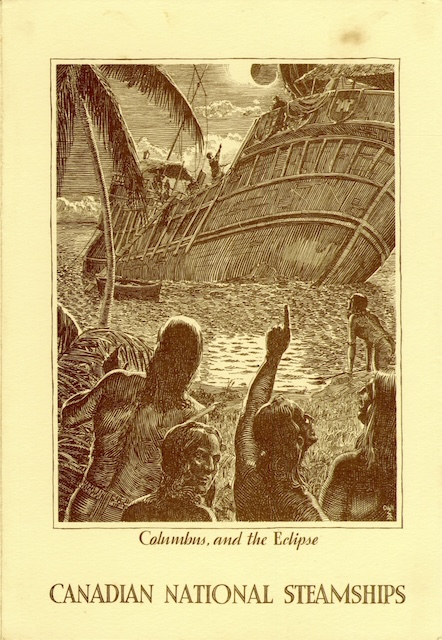A clichéd plot in several nineteenth-century novels and twentieth-century B movies involves some natives threatening to execute some invading Europeans when suddenly one of the Europeans remembers from astronomical tables that a solar eclipse is about to take place. The would-be astronomer demands that the natives release the hostages or he will make the sun disappear. When the sun does briefly turn black, the natives suddenly cower in fear.
 Click image to download a 837-KB PDF of this menu.
Click image to download a 837-KB PDF of this menu.
Something like that really happened to Columbus, only it was a lunar eclipse, not a solar eclipse; the plot took place over months, not minutes; and the natives weren’t threatening to execute the Europeans, they just weren’t giving them food for free. On Columbus’ final voyage, he ships landed in June 1503 and he traded goods with the natives for food. When he ran out of trade goods near the end of the year, the natives stopped giving them food.
Columbus had an almanac that predicted a lunar eclipse on March 1, 1504, so he used that prediction to cajole the natives into giving his hungry crew more food. Lunar eclipses last a lot longer than solar ones and he was able to use this time to convince the natives that their denying food to his crew was responsible for the disappearance of the moon. Even with these changes from the B-movie plots, it doesn’t sound very believable.
The menu’s cover art is signed “Odell,” which almost certainly refers to Gordon K. Odell. I can’t find much about him other than that he was born in Sherbrooke, Quebec in either 1898 or 1903 (sources differ) and did a number of propaganda posters during World War II. He also did the cover art on Canadian Pacific’s 1931 Resorts in the Rockies booklet.
This menu was used on a voyage of the Prince Rupert on June 23, 1934. The Rupert was Canadian National’s ship to Alaska, but this menu and several more I’ll be presenting over the next few days all have nautical themes from all over North America.
